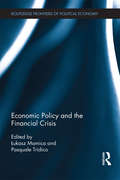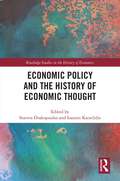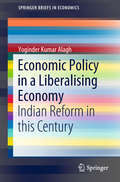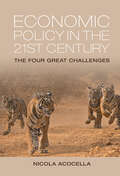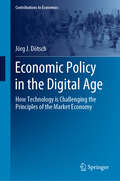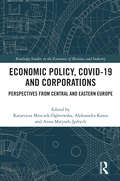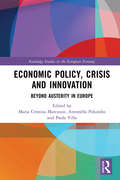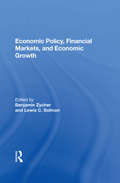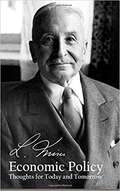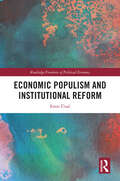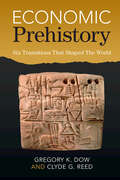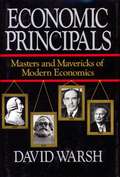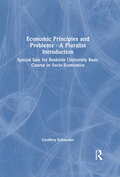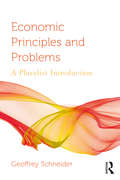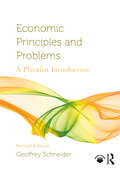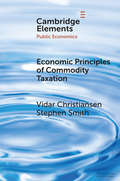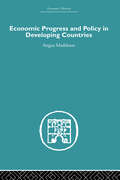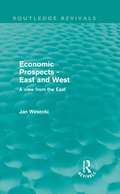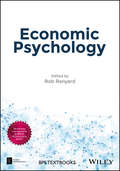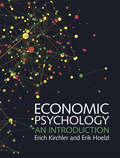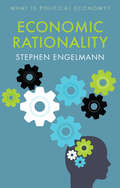- Table View
- List View
Economic Policy and the Financial Crisis (Routledge Frontiers of Political Economy)
by Pasquale TridicoThe consequences of the global economic crisis which started in the United States in 2007-08 are still being felt in most of the advanced economies, and the mainstream tools of recovery are not having the required results. It seems that many of the after-effects of the crisis, including the instability of the financial markets, increasing public debts and limited economic growth, require new solutions from both economic policy and theory. Lower aggregate demand during the crisis increased the pressure on firms to be more competitive and at the same time, the crisis in the banking system has had a negative impact on the willingness of financial institutions to give credit to companies for investment. Therefore, the key issue for current economic policy is to find a balance between the stabilisation of public finance and maintaining the momentum of long-term growth. This book offers an evolutionary-developmental analysis, combining elements of neo-Schumpeterian economics, institutional economics and post-Keynesian economics, to show that selection processes within an economy, and the institutional rules shaping those processes, are substantially more important than usually recognised by evolutionary economic theory. Two major challenges for economic theory and policy, in particular, have emerged during the crisis. The first is the rise of unemployment coupled with growing public deficits. The second is the financial instability which threatens the permanence of economic development. This book examines the performance of the advanced economies since the crisis and explores why some of them have been more successful in tackling these challenges than others. It is argued that the reasons for the varied performances of these economies lie in the economic policies which were introduced before and in the aftermath of the crisis and the differences in the regulation of their labour markets. This volume will be of interest to students and academics in the areas of macroeconomics, public economics and public management.
Economic Policy and the History of Economic Thought (Routledge Studies in the History of Economics)
by Stavros Drakopoulos Ioannis KatselidisThis book discusses key issues in economic policy in the context of the history of economic thought. Most of the current and past academic controversies in economics are, explicitly or implicitly, centred around the application and form of economic policy. This is particularly evident in the post-WWII period, with the appearance of economic policy as a distinguishable subfield, but important elements of various economic policy issues can be found throughout the history of economic thought. This book discusses various topics in economic policy – such as questions over state spending and taxation, income redistribution, and the role of money – with each chapter focusing on a particular period or major school of economic thought ranging from the ‘prehistory’ of economics up to the present day. Specific chapters of the volume cover the main schools of economic thought from different national and theoretical traditions, incorporating mercantilism, the Physiocratic School, the German Historical School, Marxism, the Austrian School, institutional economics, Keynesian economics, behavioural economics and more. This book will be of great interest to readers of the history of economic policy as well as the history of economic thought, macroeconomics and economic history more broadly.
Economic Policy in a Liberalising Economy: Indian Reform In This Century (SpringerBriefs in Economics)
by Yoginder Kumar AlaghThis book follows up on the author’s popular previous volume on Indian development planning and policy, published under the UNU WIDER series in development economics. It first introduces an evaluation of the newly mandated policy body of India, National Institution for Transforming India (also called the NITI Aayog), which replaced the erstwhile Planning Commission. As per the government site, NITI Aayog is the premier policy ‘Think Tank’ of the Government of India, providing both directional and policy inputs. While designing strategic and long term policies and programmes for the Government of India, NITI Aayog also provides relevant technical advice to the Centre and States.The book goes on to critically describe and analyse the think tank’s policies in sectors like population, demographics and poverty; agriculture and industry; and infrastructure. Lastly, the concluding chapter discusses appropriate future policies. The approach is to analyse the policy stance of the present Government in India as stated in recent official documents and to see if it has any relationship with past plans in terms of concepts or program details. In addition to the policy makers, the book is a must have resource for students of development economics, particularly of India, and provides a critical account of policies for emerging economies.
Economic Policy in the 21st Century: The Four Great Challenges
by Nicola AcocellaEconomic policy is facing crises on multiple fronts. With the effects of the last financial crisis still with us, it is now faced with the new challenges of post-Covid economic recovery and dealing with the negative effects of over consumption on the climate. This book explores the future of economic policy in relation to what the author sees as the four great policy challenges of the first half of the 21st century: the after effects of the last financial crisis and the catastrophic impact of the Covid pandemic, secular stagnation, growing poverty and inequality, and globalization. The existence of these economic problems has become increasingly relevant since some of the tools available to public action have become useless. As economists begin to suggest new instruments of economic policy, this book will help the reader understand the nature of the economic and political facts that influence both current and future generations.
Economic Policy in the Digital Age: How Technology is Challenging the Principles of the Market Economy (Contributions to Economics)
by Jörg J. DötschThis book addresses how digital technology is challenging the principles of the market economy and the consequences for economic policy. Applying the approach of the Freiburg School as a heuristic perspective, the study examines the concrete effects of digital technology on the price system and monetary policy, the openness of markets, the role of private property, and labour markets. It highlights the emergence of digital innovations such as digital currencies, digital goods, artificial intelligence, digital platforms and the sharing economy and discusses the challenges these innovations pose for economic governance and the development of adequate economic policy instruments. This comprehensive overview provides a basic understanding of the scope of the digital transformation and addresses a wide scale of important aspects of e.g. competition and trade policy, the impact of robotisation on labour market policy, and how economic policy must incorporate social aspects. The book appeals to scholars and students of economics, public management professionals, and anyone interested in the challenges of digitalisation in the context of economic policy.
Economic Policy, COVID-19 and Corporations: Perspectives from Central and Eastern Europe (Routledge Studies in the Economics of Business and Industry)
by Anna Matysek-Jędrych Katarzyna Mroczek-Dąbrowska Aleksandra KaniaThis book addresses the economic impact of the COVID-19 outbreak on Central and East European countries and examines the effect the pandemic has had on organizations in the region. It focuses on the widely understood business environment, covering companies’ responses to the crisis, the role of institutions in stabilizing markets, and the reshaping of global business trends. The book is a complex and multidimensional work that draws its roots from distinct yet simultaneously interlinked research areas. All of the chapters, whether they refer to macro-, meso-, or micro-perspectives, always highlight how crises – global and regional – change the global trends we have observed in business in the last 20 years. The book includes the most topical issues that delineate public discourse on firms’ resilience. In this way, it ‘connects the dots’ and uncovers the missing links necessary for any reader wishing to understand the specificity of contemporary companies’ responses to unexpected events such as pandemics or geopolitical crises. Further, it tackles questions such as what role institutions play in building the adaptive capacity of companies, how companies build their resilience capacity for 21st-century crises, and what the significance is of the uncertainty, the information asymmetry, and the bounded rationality concept on the company’s decision-making process. The book will find a broad audience among academics and students across diverse fields of study, as well as practitioners and policymakers. It is a key reference for all those who want to better understand the complex nature of uncertainty, crisis management, and its implications, not only for CEE countries but, first and foremost, the business environment.
Economic Policy, Crisis and Innovation: Beyond Austerity in Europe (Routledge Studies in the European Economy)
by Antonella Palumbo Maria Cristina Marcuzzo Paola VillaThis book is a Festschrift to Annamaria Simonazzi and embraces the themes that she has contributed to over the years through her insightful and inspiring works. It brings together contributions from a number of distinguished European economists, which pay tribute to her by engaging in a dialogue with her research, simultaneously reflecting on the process of growing economic disintegration in the European Union, its causes and its possible remedies. The book shows the deep interrelations between macroeconomic issues and the social sphere, and points to the need to rethink the very foundations of European economic policies as an effective antidote to growing imbalances and disintegration. In particular, the effects of austerity are assessed alongside the dimensions of inequality, gender discrimination, poverty, and unemployment, broadening the perspective also beyond the Eurozone. The authors envision a progressive society, in which investments in research and intelligent industrial policies govern the processes of technological change and drive the economy towards a more efficient and more equal model of development characterized by high productivity and high wages. While some chapters deal directly with policy issues, policy suggestions and proposals are scattered throughout the whole book. This volume will appeal to academics, economists, and policy-makers interested in understanding the policy response of European institutions to the challenges posed by both the Great Recession and subsequent developments in the European economies. The book is written in an engaging and accessible way, and the themes are broad enough to generate interest from the international public.
Economic Policy, Financial Markets, And Economic Growth ([the Milken Institute Series In Economics And Education])
by Benjamin ZycherThe links between economic policy and economic growth are simultaneously obvious and obscure, with many factors interacting to influence the overall process. The list of relevant parameters affecting economic growth of interest to scholars and policymakers is lengthy and expanding. Although the importance of government policy is widely recognized,
Economic Policy-Making by Local Authorities in Britain and Western Germany (Routledge Library Editions: The German Economy #7)
by Allan Cochrane Nevil JohnsonOriginally published in 1981 but now with a new preface, this volume provided the first detailed comparative analysis of how local authorities in the UK and W. Germany faced up to the challenge of trying to help local industry and improve employment prospects. Based on the results of case-studies the book considers the powers and resources available to local authorities and examines how the authorities are organized for this type of economic activity. The authors' analysis of the interplay of political and administrative factors will be particularly important for student and professionals in comparative public policy and public finance. The study shows how economic policy making in local government is constrained both by the higher levels of government in both countries and by the conditions in the economy operating both locally and nationally.
Economic Policy: Thoughts for Today and Tomorrow
by Ludwig Von MisesThis might be Mises's best-selling book. This release is certainly the most beautiful edition to appear yet. It is a very clear explanation of the basics of economic policy: private property, free trade, exchange, prices, interest, money and inflation, socialism, fascism, investment, and much more. As Mises discusses each topic, he addresses the many merits of market institutions and the dangers of intervention. <p><p> These chapters were originally delivered as lectures in Argentina in 1959, at the University of Buenos Aires, and later written up in prose. Mises had urged Argentina to turn from dictatorship and socialism toward full liberty, so there is a special urgency behind the cool logic employed here. The book's continued popularity is due to its clarity of exposition on the ways in which economic policy affects everyone. It is a very good text for undergraduates studying economic policy, and for anyone who wants to gain a fundamental understanding of the interaction between market forces and government intervention.
Economic Populism and Institutional Reform (Routledge Frontiers of Political Economy)
by Emre ÜnalIn response to the global crises in recent decades, many countries – both developed and developing economies – have resorted to populist forms of economic policy instead of undertaking meaningful institutional change.This book explores two forms of economic populism in particular (wage populism and exchange rate populism) and demonstrates that these types of policies result in high inflation, unstable exchange rates, and chronic macroeconomic problems. The book opens with an elucidation of the institutional economics approach – drawing on Commons and Veblen, and foregrounding laws, rules, norms, regulations, religions, and traditions – which sheds particular light on economic populism. The book also explores the different forms of economic populism that have been seen throughout the world including policies in the United States, Brexit in the United Kingdom, the response to the Yellow Jackets in France, the populism of various countries in Latin America, and regulations in China. Delving deeper, two case studies are explored in greater and comparative detail: Argentina and Turkey. In these countries, which have followed similar patterns, it is shown how following a path of economic populism has prevented the much-needed institutional reforms from being enacted. The book argues that adopting populist economic policies may prove popular in the short term but prevents and ignores the longer-term project of institutional reform, which is needed to provide greater stability. Finally, the book also looks at the types of institutional and policy reform that may be required to prevent economic populism from taking hold.This book will be of interest to readers in economics, political economy, politics, and other social sciences who are grappling with issues around populism in all its forms.
Economic Prehistory: Six Transitions That Shaped The World
by Gregory K. Dow Clyde G. ReedAround 15,000 years ago, almost all humans lived in small mobile foraging bands. By about 5,000 years ago, the first city-states had appeared. This radical transformation in human society laid the foundations for the modern world. We use economic logic and archaeological evidence to explain six key elements in this revolution: sedentism, agriculture, inequality, warfare, cities, and states. In our approach the ultimate cause of these events was climate change. We show how shifts in climate interacted with geography to drive technological innovation and population growth. The accumulation of population at especially rich locations led to creation of group property rights over land, stratification into elite and commoner classes, and warfare over land among rival elites. This set the stage for urbanization based on manufacturing or military defense and for elite-controlled states based on taxation. Our closing chapter shows how these developments eventually resulted in contemporary global civilization.
Economic Principles
by David WarshFor nearly ten years, readers of the Sunday Boston Globe and newspapers around America have delighted in David Warsh's column, "Economic Principals." This collection shows why. Taken as a whole, Warsh's writings amount to a vast and colorful group portrait of the personalities who dominate modem economics -- from the luminaries to unknown soldiers to eccentrics who add sparkle to the tapestry. Partly a history of controversies in economics, partly an essay on the evolution of the field, Economic Principals offers a glimpse of one of the most important stories of our time: the metamorphosis of a priestly class of moral philosophers into the mathematical mandarins of today, whose ideas are reshaping society even as they reveal its workings in ever more subtle detail. Warsh first recounts the rise of the economic paradigm, deftly treating the rediscovery of Adam Smith and the centrality of markets. He then turns to the generation of economists for whom the Nobel Prize was created in 1969, the men who forged the modern field in a few years during and after World War II. Some, like Paul Samuelson and Milton Friedman, are well known to the public; others, like Trygvie Haavelmo and George Dantzig, are less quickly recognized. But all have interesting stories which Warsh brings to light. Tracing the high tech revolution to the current generation, he sketches younger scholars such as Jeffrey Sachs, Martin Feldstein, and others less popularly known, who rule the field today. Marking the most powerful applications of modern economics, Warsh explains how the ingenious "rocket scientists" of Wall Street are creating new markets and the business school wizards and leading corporate executives are reinventing the organization. Finally, in exploring the implications of modern economics, Warsh introduces us to scholars operating on the boundaries of the field, from Jane Jacobs to Noam Chomsky, and to the critics, like Donald McCloskey and Robert Reich, who have brought a bit of moral philosophy back into the economist's brave new world. At every step, Warsh maps the field with the journalist's eye for detail. Readers will see why he is considered one of the most consistently stimulating economic journalists in America today.
Economic Principles and Problems - A Pluralist Introduction: Special Sale for Roskilde University Basic Course in Socio-Economics (Routledge Pluralist Introductions To Economics Ser.)
by Geoffrey SchneiderEconomic Principles and Problems: A Pluralistic Introduction offers a comprehensive introduction to the major perspectives in modern economics, including mainstream and heterodox approaches. Through providing multiple views of markets and how they work, it leaves readers better able to understand and analyze the complex behaviors of consumers, firms, and government officials, as well as the likely impact of a variety of economic events and policies. Most principles of economics textbooks cover only mainstream economics, ignoring rich heterodox ideas. They also lack material on the great economists, including the important ideas of Adam Smith, Karl Marx, Thorstein Veblen, John Maynard Keynes, and Friedrich Hayek. Mainstream books tend to neglect the kind of historical analysis that is crucial to understanding trends that help us predict the future. Moreover, they focus primarily on abstract models more than existing economic realities. This engaging book addresses these inadequacies. Including explicit coverage of mainstream economics and the major heterodox schools of economic thought—institutionalists, feminists, radical political economists, post-Keynesians, Austrians, and social economists—it allows the reader to choose which ideas they find most compelling in explaining modern economic realities. Written in an engaging style and focused on real-world examples, this textbook brings economics to life. Multiple examples of how each economic model works, coupled with critical analysis of the assumptions behind them, enable students to develop a sophisticated understanding of the material. Digital supplements are also available for students and instructors. Economic Principles and Problems offers the most contemporary and complete package for any pluralist economics class.
Economic Principles and Problems: A Pluralist Introduction (Routledge Pluralist Introductions to Economics)
by Geoffrey SchneiderEconomic Principles and Problems: A Pluralistic Introduction offers a comprehensive introduction to the major perspectives in modern economics, including mainstream and heterodox approaches. Through providing multiple views of markets and how they work, it leaves readers better able to understand and analyze the complex behaviors of consumers, firms, and government officials, as well as the likely impact of a variety of economic events and policies. Most principles of economics textbooks cover only mainstream economics, ignoring rich heterodox ideas. They also lack material on the great economists, including the important ideas of Adam Smith, Karl Marx, Thorstein Veblen, John Maynard Keynes, and Friedrich Hayek. Mainstream books tend to neglect the kind of historical analysis that is crucial to understanding trends that help us predict the future. Moreover, they focus primarily on abstract models more than existing economic realities. This engaging book addresses these inadequacies. Including explicit coverage of mainstream economics and the major heterodox schools of economic thought—institutionalists, feminists, radical political economists, post-Keynesians, Austrians, and social economists—it allows the reader to choose which ideas they find most compelling in explaining modern economic realities. Written in an engaging style and focused on real-world examples, this textbook brings economics to life. Multiple examples of how each economic model works, coupled with critical analysis of the assumptions behind them, enable students to develop a sophisticated understanding of the material. Digital supplements are also available for students and instructors. Economic Principles and Problems offers the most contemporary and complete package for any pluralist economics class.
Economic Principles and Problems: A Pluralist Introduction (Routledge Pluralist Introductions to Economics)
by Geoffrey SchneiderEconomic Principles and Problems: A Pluralistic Introduction offers a comprehensive introduction to the major perspectives in modern economics, including mainstream and heterodox approaches. Through providing multiple views of markets and how they work, it leaves readers better able to understand and analyze the complex behaviors of consumers, firms, and government officials, as well as the likely impact of a variety of economic events and policies.Including explicit coverage of mainstream economics and the major heterodox schools of economic thought—institutionalists, feminists, radical political economists, post-Keynesians, Austrians, and social economists—it allows the reader to choose which ideas they find most compelling in explaining modern economic realities. This second edition includes new and expanded material on international trade (to include disintegration and Brexit), climate issues and perspectives, including degrowth, inter-temporal exchanges and games, non-market exchanges, job opportunities, cost of education, and social media as an industry, as well as additional examples and case studies. The book’s suite of digital resources has been updated to include a test bank of multiple-choice and short-answer questions and answers, end-of-chapter questions and answers, and PowerPoint slides.Written in an engaging style and focused on real-world examples, this textbook brings economics to life. Economic Principles and Problems offers the most contemporary and complete package for any pluralist economics class.
Economic Principles for the Hospitality Industry (Hospitality Essentials Series)
by Ricardo C.S. SiuEconomic Principles for the Hospitality Industry is the ideal introduction to the fundamentals of economics in this dynamic and highly competitive sector. Applying economic theory to a range of diverse and global hospitality industry settings, this book gives the theory real-world context. Looking at critical issues around sustainable economic development in the hospitality industry such as diversification, technology, determinants of demand, and pricing, it enables students to effectively conduct business analyses, evaluate business performance and conduct effective improvements over time. Written in an engaging style, this book assumes no prior knowledge of economics and contains a range of features, including international case studies and discussion questions, to aid beginners in the subject. This will be an essential introductory yet comprehensive resource on economics for all hospitality students.
Economic Principles in Action (California Edition)
by Arthur O'Sullivan Steven M. Sheffrin<p>Social Studies Reimagined! <p>Social studies is more than dots on a map or dates on a timeline. It's where we've been and where we're going. It's stories from the past and our stories today. And in today's fast-paced, interconnected world, it's essential. <p>Welcome to the next generation of California social studies! Pearson's new California social studies program was created in collaboration with California educators, social studies experts, and students. The program is based on Pearson's California History-Social Science Standards and Framework (CAHSS) Mastery. The System uses tested best practices, CAHSS expectations, technology, and a four-part framework--Connect, Investigate, Synthesize, and Demonstrate to prepare students to be college-and career-ready while mastering CAHSS. <p>The System includes: <p> <li>100% coverage of the California State Standards. <li>CAHSS-focused table of contents that will save teachers time and improve pacing. Higher-level content that gives support to access complex text, acquire core content knowledge, and tackle rigorous questions. <li>Inquiry-focused Projects, Civic Discussions, and Document Analysis activities that develop content and skills mastery in preparation for real-world challenges. <li>Digital content on Pearson Realize that is dynamic, flexible, and uses the power of technology to bring social studies to life.</li> </p>
Economic Principles of Commodity Taxation (Elements in Public Economics)
by Stephen Smith Vidar ChristiansenThis Element provides a broad overview of economic aspects of commodity taxation, focussing in particular on theory and on policy applications in OECD countries. Some major papers in public economics have discussed whether these taxes should be levied at a uniform rate, or whether different commodities should be taxed differently, for reasons of either equity or efficiency. The authors begin with this question, and then discuss further issues, including the economic incidence of indirect commodity taxes, the properties of the VAT, the taxation of financial services, the international aspects of commodity taxation, and environmental and health policy aspects.
Economic Progress and Policy in Developing Countries
by Angus MaddisonFirst published in 2005. The central issue of our times is the unequal income of nations. Its importance outweighs most of the domestic problems in rich countries, and the division of the world into rich and poor has become more significant than the ideological cleavage between communism and capitalism. There are twenty-five rich countries, but more than 100 countries who are in the where income range. Two-thirds of the world's population live in the latter group. This study focuses on those countries and looks at economic policy and progress.
Economic Prospects - East and West: A View from the East (Routledge Revivals #Vol. 3)
by Jan WinieckiFirst published in 1987, this is an analysis of the contemporary breakdown of political and economic systems within the Eastern European communist countries. Rather than passively following the developments of this crisis, the author seeks instead to identify the reasons for failure and to examine alternative policies that offer solutions to these problems. Jan Winiecki’s work offers a comparative study of the Soviet-type economies of the East with the market economies of the West; providing a cause and effect analysis of each model, with possible scenarios for their future prospects.
Economic Psychology
by Rob RanyardA comprehensive overview of contemporary economic psychology Economic Psychology presents an accessible overview of contemporary economic psychology. The science of economic mental life and behavior is increasingly relevant as people are expected to take more responsibility for their household and personal economic decisions. The text will, in addition to reviewing current knowledge on each topic presented, consider the practical and policy implications for supporting economic decision making. Economic Psychology examines the central aspects of adult decision making in everyday life and includes the theories of economic decision making based on risk, value and affect, and theories of intertemporal choice. The text reviews the nature and behavioral consequences of economic mental representations about such things as material possessions, money and the economy. The editor Robert Ranyard—a noted expert on economic psychology—presents a life-span developmental approach, from childhood to old age. He also reviews the important societal issues such as charitable giving and economic sustainability. This vital resource: Reviews the economic psychology in everyday life including financial behaviour such as saving and tax-paying and matters such as entrepreneurial activity Offers an introduction to the field and traces the emergence of the discipline, from Adam Smith to George Katona and Herbert Simon Includes information on societal issues such as charitable giving and pro-environmental behaviour Considers broader perspectives on economic psychology: life-span psychological development from childhood to old age Written for students of psychology, Economic Psychology reviews the most important information on contemporary economic psychology with a focus on individual and household economic decision making, ranging widely across financial matters such as borrowing and saving, and economic activities such as buying, trading, and working.
Economic Psychology: An Introduction (Journal Of Psychology Ser.)
by Erich Kirchler Erik HoelzlEconomic Psychology is the only up-to-date, English-language textbook that provides a comprehensive overview of theoretical topics in economic psychology and their relevance in applied fields. Written by two leading psychologists, the book looks at how people make decisions on the use of scarce resources, in particular money, from a psychological perspective. Starting with decision making and lay theories as basic building blocks of economic behaviour, the authors go on to explore three major markets where economic behaviour occurs as an interaction between individuals and companies or institutions - consumer markets, labour markets and financial markets - before considering the challenges of collective cooperation and economic prosperity. Featuring numerous applied examples throughout, each chapter also includes an overview, a summary, figures, key terms, student questions and suggestions for further reading. This introduction is an essential resource for advanced undergraduate and postgraduate courses on economic psychology, behavioural economics and social psychology.
Economic Rationality (What is Political Economy?)
by Stephen G. EngelmannEconomics used to be called political economy, and the loss of the &“political&” tracks the ascendance of the idea of rational choice within the discipline. Where does this idea of economic rationality – choosing to maximize benefits and minimize costs – come from? What are the consequences of its rise?In this new book, Stephen Engelmann assesses these questions through a consideration of the often-hidden links between choice and government, ranging from the Benthamic utilitarianism that inspired modern economics to the contemporary economic psychologists trying to nudge everyone to choose more rationally. Multiple global crises are exposing how deficient economic rationality is as a political theory, since a focus on choice turns actors away from relations in the common. Political economy once targeted aristocratic rule – heralding a politics and ethics of egalitarian self-command and spurring democratic reform – but economics allows domination and forecloses alternatives to it. This accessible volume will be of interest to students and scholars of politics and economics, and to general readers concerned about the various ways that psychology and management have infiltrated our politics.
Economic Reason and Political Reason: Deliberation and the Construction of Public Space in the Society of Communication
by Jean Mercier YthierThe public space of democracies is constructed in a context that is marked by the digital transformation of the economy and society. This construction is carried out primarily through deliberation. Deliberation informs and guides both individual and collective action. <p><p> To shed light on the concept of deliberation, it is important to consider the rationality of choice; but what type of rationality is this? References to economic reason are at once widespread, crucial and controversial. This book therefore deals with arguments used by individuals based on the notions of preferential choice and rational behavior, and also criticizes them. These arguments are examined in the context of the major themes of public debate that help to construct the contemporary public space: "populism", social insurance, social responsibility and environmental issues. <p><p> Economic Reason and Political Reason underlines the importance of the pragmatist shift of the 2000s and revisits, through the lens of this new approach, the great utilitarian and Rawlsian normative constructs that dominated normative political economics at the end of the 20th century. Alternative approaches, based on the concept of deliberative democracy, are proposed and discussed.
